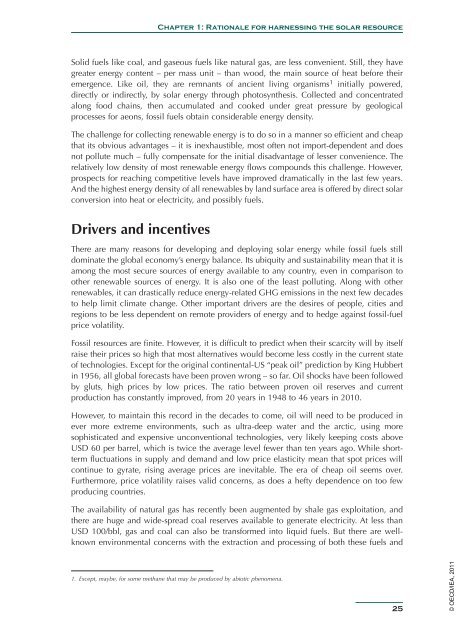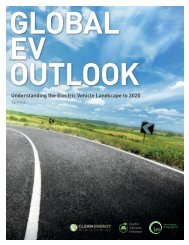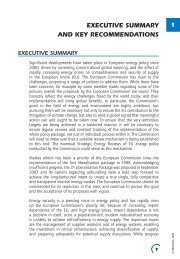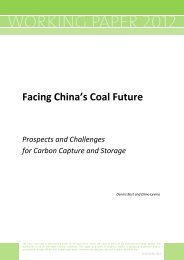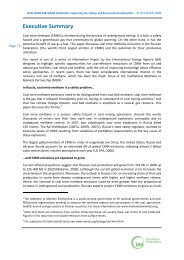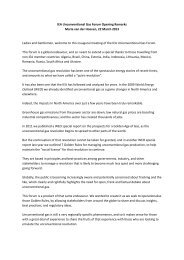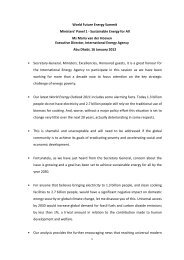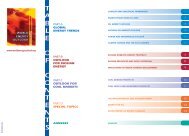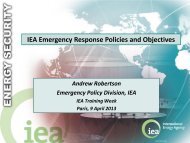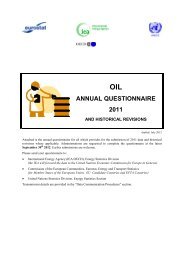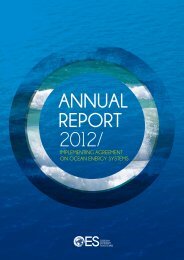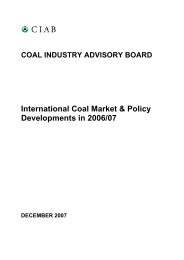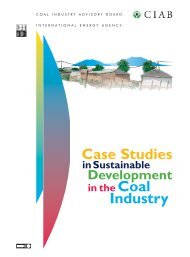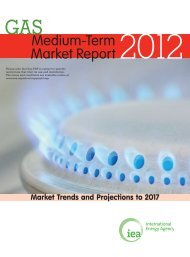Solar Energy Perspectives - IEA
Solar Energy Perspectives - IEA
Solar Energy Perspectives - IEA
Create successful ePaper yourself
Turn your PDF publications into a flip-book with our unique Google optimized e-Paper software.
Chapter 1: Rationale for harnessing the solar resource<br />
Solid fuels like coal, and gaseous fuels like natural gas, are less convenient. Still, they have<br />
greater energy content – per mass unit – than wood, the main source of heat before their<br />
emergence. Like oil, they are remnants of ancient living organisms 1 initially powered,<br />
directly or indirectly, by solar energy through photosynthesis. Collected and concentrated<br />
along food chains, then accumulated and cooked under great pressure by geological<br />
processes for aeons, fossil fuels obtain considerable energy density.<br />
The challenge for collecting renewable energy is to do so in a manner so efficient and cheap<br />
that its obvious advantages – it is inexhaustible, most often not import-dependent and does<br />
not pollute much – fully compensate for the initial disadvantage of lesser convenience. The<br />
relatively low density of most renewable energy flows compounds this challenge. However,<br />
prospects for reaching competitive levels have improved dramatically in the last few years.<br />
And the highest energy density of all renewables by land surface area is offered by direct solar<br />
conversion into heat or electricity, and possibly fuels.<br />
Drivers and incentives<br />
There are many reasons for developing and deploying solar energy while fossil fuels still<br />
dominate the global economy’s energy balance. Its ubiquity and sustainability mean that it is<br />
among the most secure sources of energy available to any country, even in comparison to<br />
other renewable sources of energy. It is also one of the least polluting. Along with other<br />
renewables, it can drastically reduce energy-related GHG emissions in the next few decades<br />
to help limit climate change. Other important drivers are the desires of people, cities and<br />
regions to be less dependent on remote providers of energy and to hedge against fossil-fuel<br />
price volatility.<br />
Fossil resources are finite. However, it is difficult to predict when their scarcity will by itself<br />
raise their prices so high that most alternatives would become less costly in the current state<br />
of technologies. Except for the original continental-US “peak oil” prediction by King Hubbert<br />
in 1956, all global forecasts have been proven wrong – so far. Oil shocks have been followed<br />
by gluts, high prices by low prices. The ratio between proven oil reserves and current<br />
production has constantly improved, from 20 years in 1948 to 46 years in 2010.<br />
However, to maintain this record in the decades to come, oil will need to be produced in<br />
ever more extreme environments, such as ultra-deep water and the arctic, using more<br />
sophisticated and expensive unconventional technologies, very likely keeping costs above<br />
USD 60 per barrel, which is twice the average level fewer than ten years ago. While shortterm<br />
fluctuations in supply and demand and low price elasticity mean that spot prices will<br />
continue to gyrate, rising average prices are inevitable. The era of cheap oil seems over.<br />
Furthermore, price volatility raises valid concerns, as does a hefty dependence on too few<br />
producing countries.<br />
The availability of natural gas has recently been augmented by shale gas exploitation, and<br />
there are huge and wide-spread coal reserves available to generate electricity. At less than<br />
USD 100/bbl, gas and coal can also be transformed into liquid fuels. But there are wellknown<br />
environmental concerns with the extraction and processing of both these fuels and<br />
1. Except, maybe, for some methane that may be produced by abiotic phenomena.<br />
25<br />
© OECD/<strong>IEA</strong>, 2011


